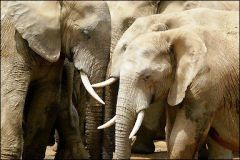British group accuses Sudanese army fuelling illegal ivory trade
Nairobi, Kenya, Mar 14, 2005 (PANA) — A British animal welfare group has accused the
Sudanese army of fuelling trafficking in elephant tusks obtained from
animals killed in the country’s southern part.

|
|
A herd of elephants at a watering hole in Port Elizabeth, South Africa (AFP) . |
In a new report, the wildlife conservation body- Care for the Wild
International, cited Khartoum-based ivory craftsmen as implicating the
Sudanese government army of poaching animals from the war-ravaged
Southern Sudan.
A researcher sponsored by the British animal welfare group, Bradley
Martin said here Monday that Khartoum has become the hub of illegal ivory
trade across the Eastern Africa region.
Martin told a news conference in Nairobi that Sudanese artisans and
shopkeepers had indicated the poachers were mainly members of the
Sudanese Army who possess the necessary firearms and ammunition. These
also have access to government transport to move tusks to Khartoum.
The British animal welfare group said elephant tusks originate from the
Central Africa Republic, Kenya and Chad. The Democratic Republic of Congo
is also a major contributor to the illegal ivory trade across the globe.
Dr. Martin, a wildlife trade specialist, said the ivory market in
Khartoum situated along the River Nile has recently turned into one of
the largest in the world. He counted over 11,0000 ivory arms in 50
souvenir shops in Khartoum, Omdurman and Khartoum north.
Most tusks for the craftsmen in the traditional Arab city come from the
recently poached elephants in the Southern Sudan, he charged.
According to ivory traders in Khartoum, transportation costs needed to
move tusks from the south to Omdurman were very high making it
uneconomical for small-scale traders.
Martin quoted the vendors, traders and craftsmen as sasying only a small
number of businessmen are involved because the cost of private motorized
transport from the south to the northern part of the country were
prohibitive.
Trade in ivory is legal in Sudan despite an international ban on ivory
trade under the Convention on International Trade in Endangered Species
(CITES) treaty. Traders are only required to show government licenses to
facilitate the movement of the ivory items.
Animal welfare groups say the development is a slap on the face of
attempts to preserve elephants and other wildlife whose poaching has been
an issue of concern among conservation circles.
Sudan not only has one of the largest retail markets for ivory in Africa,
but raw tusks are also moved through Khartoum and Omdurman to Egypt where
there is a flourishing ivory market.
The United States recently opposed the trafficking in ivory, saying it
would not support the stealing of Africa’s natural resources to be used
for beautifying sitting rooms in Europe and the Middle East.
Due to poaching, the elephant population in Southern Sudan is believed to
have drastically fallen from 133,000 in 1976 to about 40,000 in 1992
although there are no accurate figures, Martin said.
